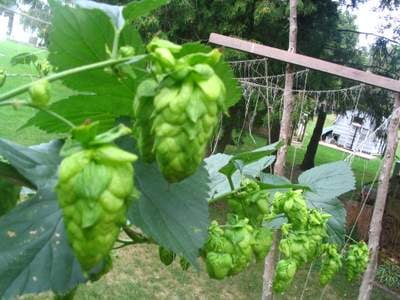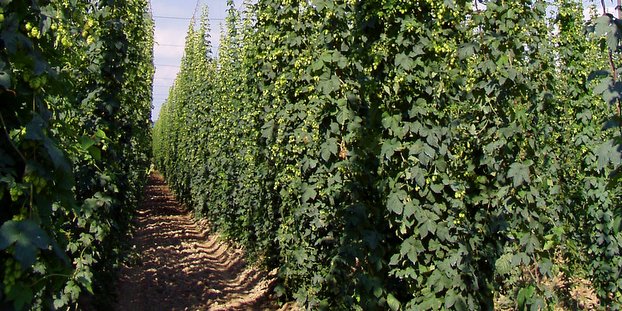Aspiring farmers are starting to grow hops more and more these days, mirroring the growth and entrepreneurial spirit of the craft beer industry itself, and hoping to offer home-grown alternatives to the big name hop sources like Hop Union or Yakima Chief. Many of the hop farming start-up stories this year have come out of New York state, but the idea is spreading all over the country.

TriCities.com, a news source for northeast Tennessee and Southwest Virginia, penned an excellent profile of Virgina hop farmer Justen Kelly Dick, a 35-year-old geologist and environmental consultant who traded in a stable job for the unpredictable job of farming hops, but it was the right move for him.
From TriCities.com:
“It sounds cheesy, but to be able to see the fruit of my labors,” Dick said. “The more middlemen you can cut out between you and your enterprises, the better. I just enjoy seeing our property get back into use rather than just leasing it out.”
…
“The year after next, I’ll be expanding quite a lot,” he said. “I hope to get up to two to three acres (for hops) in two or three years. I’ve got about 20 acres mentally picked out. That’s a big step.”
Not unlike Erica Goodman, who transitioned her family farm from dairy to hop farming, or Schuyler, N.Y.’s David Pasick, who got the idea to go into hop farming when he found wild hops growing on his barn, Dick is part of a younger generation’s passion to create a tangible product and interact within the local business community.
For Dick’s part, he gave his first 2 lbs of harvest hops to Wolf Hills Brewing Co. The keyword there is “gave.” But Wolf Hills made good use of the hops to brew its Fightin’ Parsons Pale Ale. Brewer Drake Scott appreciated the hopping hand, but explained what Dick is up against.
Again, from TriCities.com:
“There’s only about seven acres of hops grown in the state of Virginia,” Scott said. “We go through about 40 to 50 pounds of dry hops per week. Wet hops, that’s about 200 to 250 pounds per week.”
…
“They can’t keep up,” Scott said.
Even established hop farmers have problems — from pests to unpredictable weather. And let’s not forget the incredible cost of starting a hop farm. But just as small brewers faced decades of Big Beer competition with small business difficulties, local hops farmers are also hoping to change and industry and leave their own mark.





@VABeerTrail @RichardHartogs @CraftBrewingBiz were getting there slowly! Thanks for the mention. We should have 300 hills in VA by spring.
Very cool to see. http://t.co/beGCZqPfyE
Thx! For @piedmonthops as well! #VABeer RT @RichardHartogs: @CraftBrewingBiz this is a good article for @VABeerTrail http://t.co/w9lykoN0Ou
@CraftBrewingBiz this is a good article for @VABeerTrail http://t.co/KjGHSCFsSE